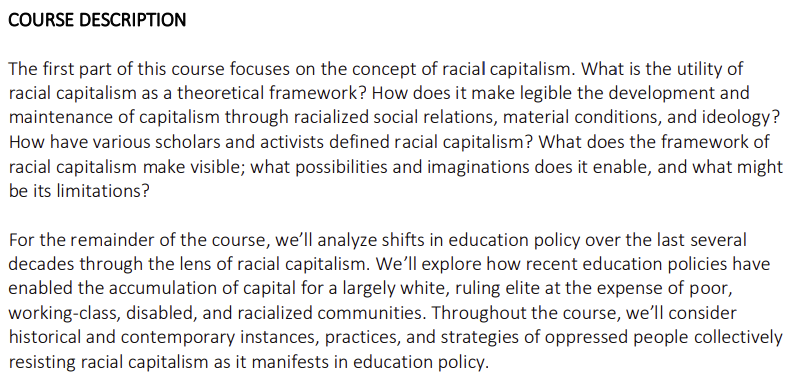Colgate University (CorruptED)
Incidents
Colgate University’s Department of Educational Studies courses feature topics such as Marxism, racial capitalism, tenets of queer theory, white supremacy, and whiteness. Texts and readings include Bell Hooks and Paulo Freire.
The department website states that students “gain a critical understanding of the relationship among power, knowledge, education, and society.”

COURSES
EDUC 101: The American School
The course EDUC 101: The American School features topics such as ableism, colonialism, Marxism, Movement for Black Lives, tenets of queer theory, and whiteness. Texts and readings include Bell Hooks and Paulo Freire.
The course description states it “introduces some of the major ideas and issues in the American educational system, including the aims and role of public schooling in a democratic society, the foundations and politics of knowledge and instruction, and the manner in which education can function as either a liberating or oppressive force for human and social development.”


EDUC 205: Race, White Supremacy, and Education
The course EDUC 205: Race, White Supremacy, and Education states that students will “study issues such as white supremacy, social justice, racial and ethnic identity, immigration, integration (desegregation/resegregation), race relations, socioeconomic inequality, language programs, and transformative education.”

EDUC 303: Decolonizing Development: Gender, Power & Education in International Development
The course EDUC 303: Decolonizing Development: Gender, Power & Education in International Development states that it draws on “critical development studies, decolonial/transnational feminisms, and anthropology and sociology of education, this course seeks to examine educational development efforts from both a critical gender and policy analysis perspective and frames the question of girls’ education in an increasingly globalizing world as issues of equity, empowerment and social justice.”

EDUC 310A: Racial Capitalism and Education Policy
The Colgate University course titled EDUC 310A: Racial Capitalism and Education Policy features topics such as racial capitalism, white supremacy, and whiteness.
The course analyzes shifts in education policy “through the lens of racial capitalism.”
According to the course description, this class explores topics such as:
- How racial capitalism contributes to the “development and maintenance of capitalism through racialized social relations, material conditions, and ideology.”
- How recent education policies have “enabled the accumulation of capital for a largely white, ruling elite at the expense of poor, working-class, disabled, and racialized communities.”
- “Historical and contemporary instances, practices, and strategies of oppressed people collectively resisting racial capitalism as it manifests in education policy.“

The course’s required literature, What’s race got to do with it: How current school reform policy maintains racial and economic inequality, is a book that proposes how contemporary school reform policies contribute to sustaining racial and economic disparities.

The course schedule includes readings and videos such as:
- Angela Davis on Racial Capitalism
- Burden-Stelly (2020), Modern U.S. Racial Capitalism
- Melamed (2015), Racial Capitalism
- Ruth Wilson Gilmore, Geographies of Racial Capitalism
- Handel (2020), If Biden is Serious About Healing the Country, He Must Change Education Policy
- Au (2020), Chapter 1: High-Stakes Testing: A Tool of White Supremacy for over 100 Years
- White (2020), Chapter 7: Charter Schools: Demystifying Whiteness in a Market of “No Excuses” Charter Schools
- Stein (2018), Confronting the Racial-Colonial Foundations of U.S. Higher Education
Stay Informed
